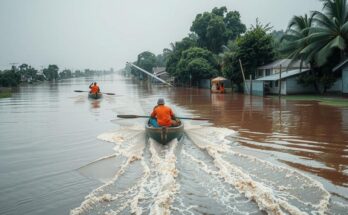A preliminary study reveals that climate change intensified Cyclone Chido, which has become 40 percent more likely in today’s warmer climate. The cyclone was particularly destructive in Mayotte, leaving the death toll potentially rising into the thousands. The study used advanced modeling to conclude that Chido’s wind speed increased substantially due to climate warming, raising the storm’s classification from Category 3 to 4.
A preliminary study conducted by scientists at Imperial College London indicates that climate change significantly intensified Cyclone Chido as it approached the Indian Ocean archipelago of Mayotte. This research posits that storms of Chido’s magnitude are now 40 percent more probable in the current climate of 2024 compared to pre-industrial periods. Cyclone Chido, classified as a category four storm, has been recorded as the most devastating cyclone to hit Mayotte in nearly a century, causing extensive destruction upon landfall on Saturday.
The cyclone wreaked havoc, particularly among the vulnerable population of Mayotte, where roughly one-third reside in substandard housing. While the complete extent of the tragedy remains undetermined, authorities are apprehensive that the death toll could eventually climb into the thousands. According to the scientists’ investigation, global warming has heightened the wind speed and intensity of tropical storms such as Chido, with their advanced computer modeling suggesting an increase of 3 miles per second in wind speeds compared to pre-industrial times.
The study emphasizes that climate change elevated the severity of Cyclone Chido from a Category 3 to a Category 4 storm. Although France’s weather service refrains from directly linking Chido’s intensity to climate change, they acknowledge that the rising ocean temperatures due to human-induced climate change have contributed to the formation of more violent storms. The cyclone’s trajectory over Mayotte exacerbated its impact, as confirmed by Meteo-France.
Currently, the global climate averages approximately 1.3 degrees Celsius warmer than levels recorded prior to the industrial revolution, leading to more frequent and extreme weather phenomena. The increase in temperature allows warmer air to retain more moisture, while warmer ocean temperatures enhance evaporation, creating conditions that significantly fuel tropical storms.
Climate change is a pressing global issue, its impacts becoming increasingly evident in environmental phenomena, including tropical storms. As temperatures rise due to the combustion of fossil fuels and other anthropogenic activities, scientists have observed changes in storm patterns, frequency, and intensity. Cyclones, such as Cyclone Chido, are becoming more potent as a result of these climatic shifts, raising concerns regarding the potential for more devastating natural disasters in vulnerable areas populations live in precarious conditions with inadequate infrastructure to withstand severe weather events.
The findings from Imperial College London underscore the nexus between climate change and the heightened intensity of tropical cyclones like Chido. This correlation highlights an alarming trend in climate-driven extreme weather, which poses significant risks to affected populations, particularly in under-resourced regions. Authorities and communities must recognize the role of climate change in shaping future storm patterns as they address immediate disaster responses and implement long-term resilience strategies.
Original Source: www.barrons.com




